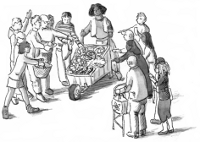
Co-operation - working together with others (rather than competing with them) is as old as history, but modern co-operative businesses have been around for just 200 years.
Co-operatives were formed by workers in the 18th century who set up shops to break the monopoly of the large factory bosses supplying overpriced, low quality food to workers. The shops not only provided good food at a decent price, they also provided fair and equitable conditions for those working there.
A co-op is an enterprise run and controlled democratically by the members - for the benefit of all the members. They define themselves by the Co-operative Principles and the Co-operative Values.
Nowadays there are many different types of co-ops, here are just a few:
Co-ops are a different way of providing for our needs such as housing, work, services and the exchange of goods.
Normal businesses provide profits to shareholders and capitalists, but co-ops are part of creating a different type of society based on community links, self-help and mutual aid. They enable people to follow the principles of co-operation and fairness even in a society based on competition and exploitation.
We want to see a world based upon equality and co-operation, where people give according to
their ability and receive according to their needs. Where work is fulfilling and where creativity is encouraged, where decision-making is open to everyone with no hierarchies and where the environment is valued and respected in its own right rather than exploited.
From the aims and
principles of Radical Routes, a network of small co-ops in the UK
Co-operation: limited only by your imagination!
